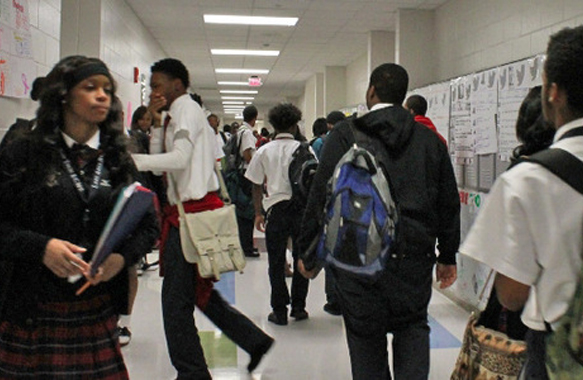By Michael Deshotels | Originally Published at Louisiana Educator. August 9, 2015 | Photographic Credit; Students at Lake Area New Tech, New Orlean
This faux research technique is used primarily to prevent us from noticing the extremely low performance of the New Orleans RSD in the ten years since Katrina
Harris uses a very dense and confusing array of research strategies to convince us to disregard the most basic data on the actual performance of the New Orleans charter schools comprising the RSD. He attempts instead to make obscure comparisons of growth in performance by matched groups that show that the RSD is succeeding in greatly improving student performance in New Orleans. Based on these obscure caparisons he concludes that the New Orleans “portfolio model” should be a model for turning around struggling schools across the nation. Harris utilizes a comparison of the RSD schools using a “difference between the two differences between the treatment and comparison groups” that supposedly “yields a credible estimate of the policy effect.” This stuff is just gobbledegook! This faux research technique is used primarily to prevent us from noticing the extremely low RSD performance in the ten years since Katrina.
Don’t believe your lying eyes! Harris wants to distract us from the actual performance of the charter schools administered by the RSD and have us focus only on his complex growth comparison analysis
Here are the indisputable facts as verified by Louisiana Department of Education Data
- The latest performance of the N.O. RSD schools as a whole places them at the 17th percentile in students who performed at the basic level on state tests. This means that 83% of the other school systems in Louisiana produced better results than the RSD.
- ACT scores in the RSD now average 16.6. That’s not enough for a student to be funded to enter even the least demanding Louisiana community colleges. 94% of Louisiana school districts produced better ACT results than the RSD.
- The RSD graduation rate is dead last in the state! 61.1% not counting the kids who drop out as early as 7th and 8th grades. That’s last place out of 72 school systems! The RSD is still the biggest dropout factory in the state, with many low performing students being pushed out as early as the 7th and 8th grades. (See this latest report from Research on Reforms)
- Even though most RSD schools tout themselves as college prep, only 5.5% of their students who take Advanced Placement courses in the RSD score high enough on the AP tests to get credit. Again, one of the lowest results in the state.
The title of Douglas Harris’ article about the performance of the New Orleans RSD was Good News for New Orleans. The author makes the following statement: “The rest of the country wants to know how well the New Orleans school reforms have worked. But the residents of New Orleans deserve to know.” Yet the article did not cite a single statistic that compares the performance of RSD students with the rest of the students in the state or with the rest of the country.
We are just supposed to take Harris’s word that the RSD is on a great trajectory of improvement. That might have worked for the first few years of the school takeover. But now it’s been 10 years! The real statistics show very poor results. Any other states’ leaders that choose this method of school turnaround should have their heads examined!
Michael Deshotels is a retired Louisiana educator who taught science at the secondary level. He also served in various positions with the Louisiana Association of Educators culminating in the position of Executive Director prior to his retirement. More recently Michael Deshotels researched the dropout problem in Louisiana and as a result helped to draft and pass legislation providing for a career diploma designed primarily for non-college bound students. With Louisiana Educator Michael attempts to inform educators, parents and school board members on the current issues in education from the point of view of an experienced educator.
This piece was reprinted by EmpathyEducates with the kind permission of the Author, Michael Deshotels. We are grateful for the research and for what we believe invites an important discussion.












Leave A Comment